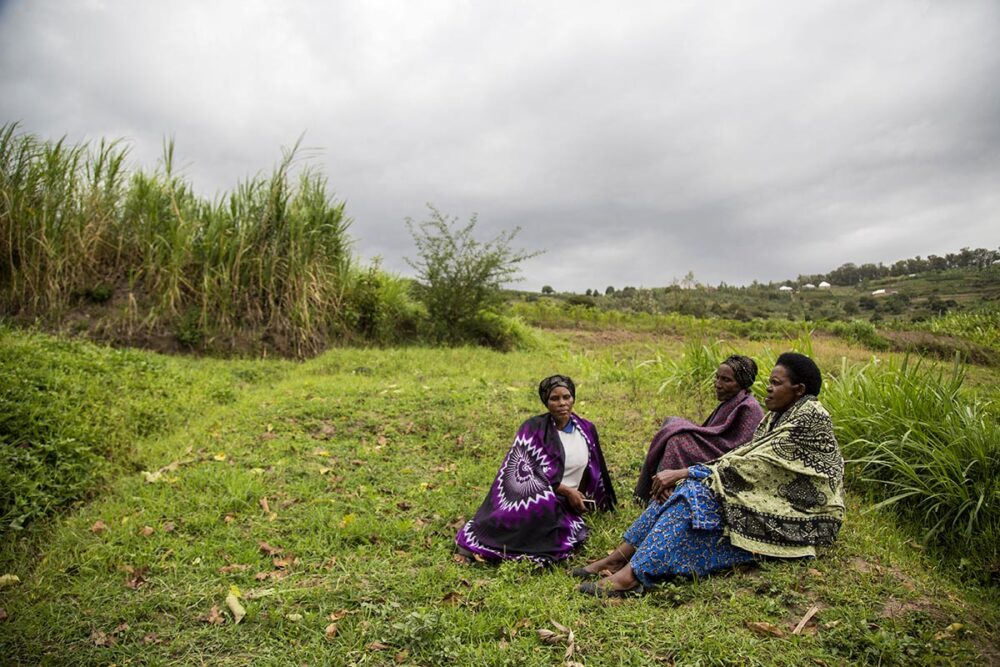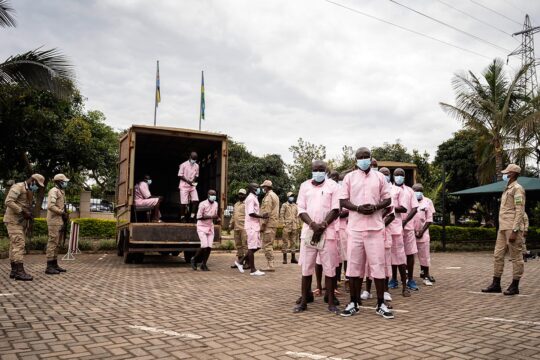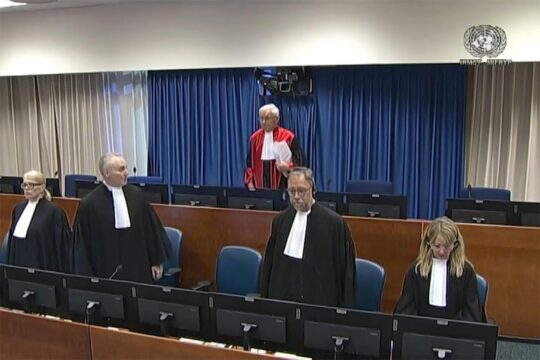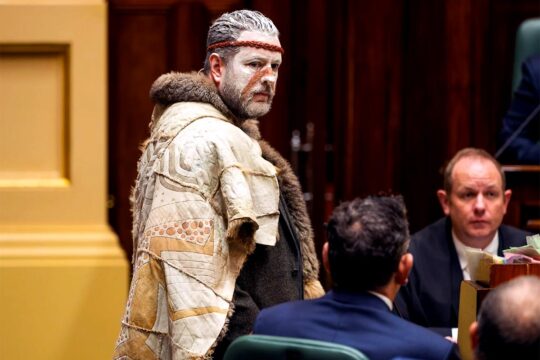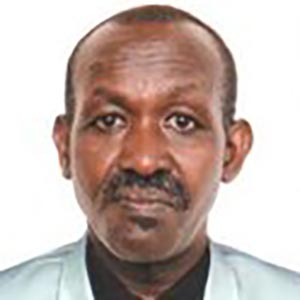Augusta Mukasengoga
On the morning of April 7, 1994, she was hacked with a machete. Her husband and four of their children were killed. Only one daughter was saved in extremis. In her village in the east of the country, she never really got justice. It is only every April 7 that she reconnects with her community, to commemorate her loved ones.
“Thirty years after the genocide, living together has reached an incredible stage. Good leadership has tried to stitch together the social fabric that was completely torn apart in 1994, and has brought victims and former executioners back together without vengeance, living together in this country. It’s a kind of reconciliation made possible by laws and rules. It couldn't have been any other way: Rwanda needed to be a state governed by the rule of law, for once in its history.
But true reconciliation is also, and above all, the unconditional bond gradually forged between victim and perpetrator, previously separated by the great gulf that the genocide created. It was unimaginable. In some places, thanks to the joint efforts of charitable organizations, individuals and the State, we have seen repentant genocide perpetrators approach victims’ families and ask forgiveness. Victim-perpetrator associations and villages have sprung up. As for me, I'm still waiting for my executioners and those of my family. I can't do any better than that. But sometimes I try to forget all that.
Once, the executive secretary of my sector called to say why didn't I come to ‘grant forgiveness’. I complied, but asked that the meeting be held in the ruins of my former home. On the day, no one came. Is this reconciliation, asking survivors to forgive those who don't even ask for forgiveness? Reconciliation cannot be a one-way street. Otherwise, it would be superficial and fragile.
True reconciliation is achieved through concrete individual actions that lead to living together without suspicion, and finally to symbiosis. For some, it's not yet there, but its seeds have begun to grow, to sustain future generations.”
Elina Ganza
Elina Ganza (not her real name), 29, born of her mother’s gang rape as a young girl during the 1994 genocide, now lives with her mother in poverty in a central Rwandan village. Her only family are an aunt and uncle on her mother's side, and cousins. The greatest challenge for her, as for all the children of the Interahamwe (the militiamen that spearheaded the genocide), is reconciliation with herself, her mother and her family, with the help of the NGO Sevota. “Other people come second,” she says.
“Now I finally understand that I don't have a father and it was not my mother’s fault. We used to be at loggerheads, but when I found out what had happened to her, I forgave her. Sevota brought us closer, reconciled us and helped us bond.
I also know that if her sister and brother, survivors like her, rarely see her, it's because of me. They used to call me names too. I understand them, but they should understand me and their sister too. Understand that bad luck has befallen us all and that none of us is to blame. If there's one thing that comforts me, it's that today there are in effect no Hutus or Tutsis - everyone is Rwandan.
For me, reconciliation means the hope or guarantee that what happened will never happen again in our country, because of the culture of national unity. Where would we be today if the country had not opted for the path of living together? The future is bright!
Stephen Mico
Born in 1995 in a refugee camp in Zaire, now the Democratic Republic of Congo, young Stephen (not his real name) is another of the thousands of children born to women raped during the genocide. His life has always been a struggle. While he has forgiven everyone, he has had to learn to take the first step towards reconciliation, even with his family.
"At school, even the teacher targeted me, calling me ‘the Judas who doesn't talk or cry when he's beaten up!’ When I returned home, my aunts and uncles treated me the same way. I lived at my grandmother’s, where my mother -- also stigmatized by the society – had left me as the child of the Interahamwe, the unloved one. Today, she's back and I've made peace with her.
With other people, I have to take the first step every time. With my cousins, my aunts and uncles, as if I were asking them to forgive me in place of my militiaman father, whom I don't even know. Thirty years on, even though there are no more bad words spoken about me, I feel that there is still unconfessed rejection and a label of undesirable stuck to me.
All in all, outside in the village everything is back to normal. It's not like ten years ago. I see survivors and genocide perpetrators sharing the same table. In some places, even weddings take place and cows are given to each other as in the old days. Nevertheless, some genocide perpetrators have shut themselves in silence, blocking the whole process. They hide the truth, even from their families and children. They are living 30 years in the past, before 1994.”
Gérard Museruka
His extended family lived in Ntarama, in the Bugesera region southeast of Kigali. It was in a church of the same name, transformed into a memorial, that some of them were massacred and lie buried. This survivor knows nothing of how they died. Nothing has come out of the trials that could help him to find out and to reconcile.
“Yes, we rub shoulders, but sometimes we have nothing to say to each other. We just live together. They themselves [genocide perpetrators] are ashamed of what they did to their neighbours. After prison, they returned to the village with no real repentance, and saw survivors there again. Some may feel remorse and shame, others may not. It's a peaceful cohabitation pending reconciliation, perhaps.
After such a genocide, I recognize that reconciliation is a long process and requires mechanisms, that it must be based on fair justice with reparation for the damage suffered and also with the clear conviction that what happened will never happen again. But the solid foundation is political will, and that's what protects everyone.”
Marie Jeanne Gasengayire
She is the eldest of a family of seven children, four of whom were killed with her parents, including her mother who was killed by a neighbour in a terrible way. Marie Jeanne has never been to the gacaca trials, because she was “dealing with the trauma”. What about reconciliation? “I don't know," she says, “maybe later.”
“Do you think those people who killed our people really need to reconcile with us? I don't think they do. If that were the case, they would have made at least a small gesture, acknowledging what they did and so reconciling with themselves, before coming to us.
The fact that there were survivors seems to bother them, and I've resolved to live further away from my village. I know they don't want to see me. And I don’t want to see them. Fortunately for them and for us, we live under the rule of law. And they know that the law protects everyone. Not like in 1994! If they're not ready, I'm not ready either. I don't know, maybe later it will be possible for our grandchildren.
Ruzigana Emmanuel
From his prison in Muhanga in central Rwanda, as the end approaches of his 30-year sentence for his role in the Tutsi genocide, former mayor of Nyamabuye (in the former prefecture of Gitarama) Ruzigana is already thinking about life on the outside. He has prepared for it with his guilty plea, which he says has already reconciled him with himself, his family and neighbours. His keywords are deeds, rather than just words.
“When I see that former Tutsi neighbours often visit me, as well as my family, it touches my heart. Reconciliation is possible, it’s not a dream. But it requires moving from theory to practice. For me, I have to start with my own family first. Indeed, after 30 years of absence, even your wife or husband has changed, and your children have grown and changed. So it takes a psychological approach and support to re-establish harmony as husband and wife, parent and child. This is as true for me as it is for fellow inmates who are due to be released soon.
As for neighbours and victims, there's a real gulf between us created by the genocide, which neither side can bridge without the help of a third party. Then you have to use your imagination, and draw on Rwandan culture to find actions and tangible things that can bring you together and re-bond you. I'm thinking in particular of working together in the fields and other small gestures to support victims, who are often poor, in their daily lives.”
Moïse Nsengiyumva
This former teacher was sentenced to 15 years in prison for genocide. He still has a year to go before being released. Even though he pleaded not-guilty, he doesn't think he's far from reconciliation.
“Here in prison, we have ‘unity and reconciliation clubs’, civic education sessions, and also Christian organizations like Prison Fellowship or Justice and Peace. All of this helps us move towards reconciliation. But there's another key factor: time heals and cleanses our brains.
Those who have committed genocide nevertheless deserve special support once they have returned to society, to help them gradually learn to live there again. I believe they need support to help them understand and resolve family problems that may lead them to commit further crimes -- problems linked in particular to what may have happened during detention. I'm thinking, for example, of certain women who have had extra-marital children, and of land issues.
On the outside, a lot of people are superficial, and this gives free rein to a façade of reconciliation. But if I can get some lucrative activities with victimized families that impact us all, that means instinctively we don't wish each other any harm and we protect each other.”
Etienne Gatanazi
After the genocide, Etienne Gatanazi travelled the hills and valleys of Rwanda for many years, reporting on the genocide. He is one of a group of Rwandan court reporters who follow the post-genocide situation on a daily basis. He thinks what has happened in these hills, where “life together” has been resumed, is nothing short of a miracle from God.
“After genocide, reconciliation is not always easy, but it is possible. Here, part of the population of the same country aimed to exterminate their neighbours. Thirty years on, in my opinion, the foundations for reconciliation have already been laid: a shared culture and language, inter-ethnic marriages and shared social values, which explain why Rwanda is already united.
So-called ‘reconciliation’ villages have sprung up in the hills of Rwanda, where survivors and their torturers coexist. It was torture for the survivors in the early days, but it produced good results. Now former perpetrators and victims share the same fields, work and celebrate together.
After demons set Hutus against their Tutsi brothers in 1994, the God Imana of Rwanda descended and produced his miracle of reconciliation between enemy brothers. Anything is possible in the land of made-in-Rwanda solutions!”
Rachel Mugorewase
At the age of 12, Rachel Mugorewase went into exile in what was then Zaire, with her family, some of whose members had committed genocide. She had been told their enemy was the Inkotanyi (fighters in the armed rebellion that seized power in Rwanda in July 1994), the Tutsi whom she would never marry. Back in Rwanda after a forced repatriation in 1997, she went through a total change of vision, and repentance. She tells of her complete integration. Better still, she married a genocide survivor. Today, this mother of two is busy running an NGO to reconcile former genocide perpetrators and victims, starting with her village.
“When I was forcibly repatriated with thousands of other Hutus, I was surprised to see that they hadn't killed us but, on the contrary, had given us back our property. Listening to these Inkotanyi preach unity and reconciliation, I couldn't believe it. In the aftermath, I went back to school, up to university level on State funds. And then I got a job. There were no limits for me, because I was even part of the city leadership of Kigali, then on the Consultative Council of my native district Ruhango, right up to the present day.
Contrary to what I swore I'd never do, I married a Tutsi, a survivor of the 1994 genocide. I did this out of love! I'm fine with my in-laws, who give me gifts whenever I need them. I know that my case is not alone and, along with many others, it shows reconciliation is a living and promising reality.
Yet the ideology of genocide is still out there, lying dormant inside the country among people who have walled themselves in silence about their role in the genocide. Also in broad daylight, in the asylum countries that have taken in genocide suspects and their children. All this, added to the failure to return destroyed or looted property, fosters a climate of suspicion among genocide survivors and constitutes an inescapable barrier to true reconciliation.”


